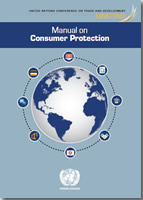More than half a century ago, President John F Kennedy defined modern consumer rights in a special message to the United States Congress on protecting the consumer interest.
"If consumers are offered inferior products, if prices are exorbitant, if drugs are unsafe or worthless, if the consumer is unable to choose on an informed basis, then his dollar is wasted, his health and safety may be threatened, and the national interest suffers," President Kennedy told US lawmakers on 15 March 1962.
"On the other hand, increased efforts to make the best possible use of their incomes can contribute more to the well-being of most families than equivalent efforts to raise their incomes," he added.
Since then, protecting the consumer has become a global endeavor and a cornerstone in the fight to end poverty, reduce inequalities and make consumption patterns more sustainable. And the laws and regulations have had to adapt as shopping has increasingly become an online activity.
Two decades after the former US leader stuck up for American consumers, the United Nations General Assembly adopted the UN Guidelines for Consumer Protection, in 1985 (resolution 39/248).
The guidelines established principles for designing impactful consumer protection legislation and building effective enforcement institutions, taking into account countries' varying economic, social and environmental circumstances.
They were then revised in December 2015 (resolution 70/186) to reflect the rise of electronic commerce - worth an estimated $25 trillion in 2015 - and ensure consumers are also protected in digital marketplaces.
With the 2015 update, UN member states also put UNCTAD at the centre of global consumer protection.
Teresa Moreira, head of UNCTAD's competition policy and consumer protection branch, says: "As the focal point on consumer protection issues within the United Nations family, UNCTAD is committed to deliver for the welfare of consumers and work for member states' institutions and capacities."
She adds: "UNCTAD's technical cooperation and capacity building programmes on consumer protection foster economic efficiency, support pro-competitive regulations, promote responsible business practices and improve awareness and information campaigns on consumer protection, ultimately increasing access to non-hazardous products, and encouraging consumers' right to just, equitable and sustainable economic and social development and environmental protection."





